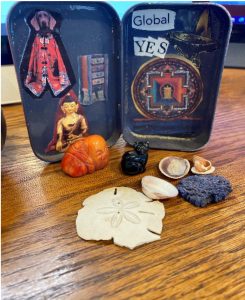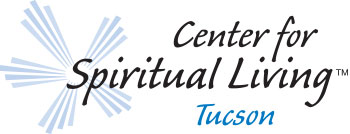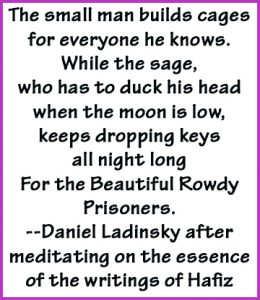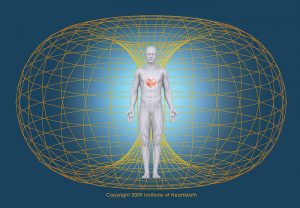Yay for Boats in the Desert!
Reverend Janis described using a boat. She loves her boats. I love my boats. What we are referring to is the joke about the man stuck on his roof during a devastating flood. When a boat approaches, he declines help, saying that God will rescue him. A helicopter comes by to rescue him and he declines their help, explaining that God will rescue him. Then he drowns. When he gets to heaven, he asks God why God didn’t rescue him. God replies, “I sent a boat and a helicopter!” A boat refers to receiving help recognizing that, in unity, we are all one and that help received is the same as help given. And the awareness that the Divine will provide help to me through people.
My two most recent experiences of receiving help were from two of my coaches. I have a business coach and a Health and Wellness (H&W) coach. I also have a sponsor in the 12-step program to which I belong.
My H&W coach meets with me every 2-3 weeks. She is wonderful and helps me establish good health habits. We work on ways to deal with my feeling of panic that causes me to overeat. She helps me devise strategies that help me get to sleep as it often takes me 45-60 minutes to power down enough to fall asleep. I was explaining that I had stopped walking with my girlfriends because I was focusing on completing tax returns before the deadline. The problem was that I was not finding that I had any extra time as I gave up my movement. She advised me to start moving again. She has been working with me for about 1 year and commented on how important exercise is to me. And reminding me that I do better when I have a hard work out. That was on July 2. The next day I walked 21⁄2 miles with my friends. On July 4, I got up early and walked around Randolph Park from my house and back, a distance of 4.5+ miles. I have been doing that daily since and feel so much better. On rest days, I walk 3 miles because I need movement every day. My body expects it.
I meet with my business coach monthly. She is an integrative coach who believes that personal and business are the same. I receive guidance of a practical sense – she transformed my time management by helping me set up a hybrid system using a Google sheets list of tasks and a daily planner because she says that I have my long list and then every day I tend to work off a separate agenda. That is totally true. When I talked to her about needing to trust my ability to complete my work on time and relaxing instead of living in stress based on deadlines, she later said that she knew that I needed to increase my connection to Spirit.
Through her skillful questioning I was able to come back into knowing that my business  success is Spirit-based and that I can rely on the Divine to ease my way with regard to deadlines and tasks that appear challenging. This is extra important as I am preparing for an audit with my largest client. Last year’s audit was very difficult and so my “triggers” are in full force. Using our Science of Mind philosophy, I remember I need to see through appearances to know the reality that all is perfect and whole. Applying SOM to my work means that even though I experience stress dealing with strong personalities and the appearance of authority, it is my job to look beyond appearances and know that my tasks are manageable and that I have the resources I need to complete the task. Talking with her re- centered me and I was able to discuss strategies to remind me of my connection with Spirit throughout my day. And like Science of Mind, I looked over at my windowsill and saw my little altar full of keepsakes that I created several years ago with friends. It’s in a repurposed Altoids tin. I closed it up and put it in my desk drawer and I intend to look at it daily.
success is Spirit-based and that I can rely on the Divine to ease my way with regard to deadlines and tasks that appear challenging. This is extra important as I am preparing for an audit with my largest client. Last year’s audit was very difficult and so my “triggers” are in full force. Using our Science of Mind philosophy, I remember I need to see through appearances to know the reality that all is perfect and whole. Applying SOM to my work means that even though I experience stress dealing with strong personalities and the appearance of authority, it is my job to look beyond appearances and know that my tasks are manageable and that I have the resources I need to complete the task. Talking with her re- centered me and I was able to discuss strategies to remind me of my connection with Spirit throughout my day. And like Science of Mind, I looked over at my windowsill and saw my little altar full of keepsakes that I created several years ago with friends. It’s in a repurposed Altoids tin. I closed it up and put it in my desk drawer and I intend to look at it daily.
I also poured pink Himalayan salt that my coach, Tabitha, said is very clearing spiritually into a singing bowl to keep by my computer screen. I can play with it while on Zoom calls. She suggested I purchase some palo santos sticks, which I did, to burn daily to spread peace and positivity. I grabbed my Angel Therapy oracle cards and fired up my essential oils diffuser. I feel totally blessed to receive help, guidance and support from my friends. Ha!
I do pay both of them and they are also clients of mine so we totally help each other out! And the fact that Tabitha supports my spirituality is an added bonus. It reminds me that I am loved and that the Divine does indeed provide what I need by giving me boats in the desert.
-Marya Wheeler






